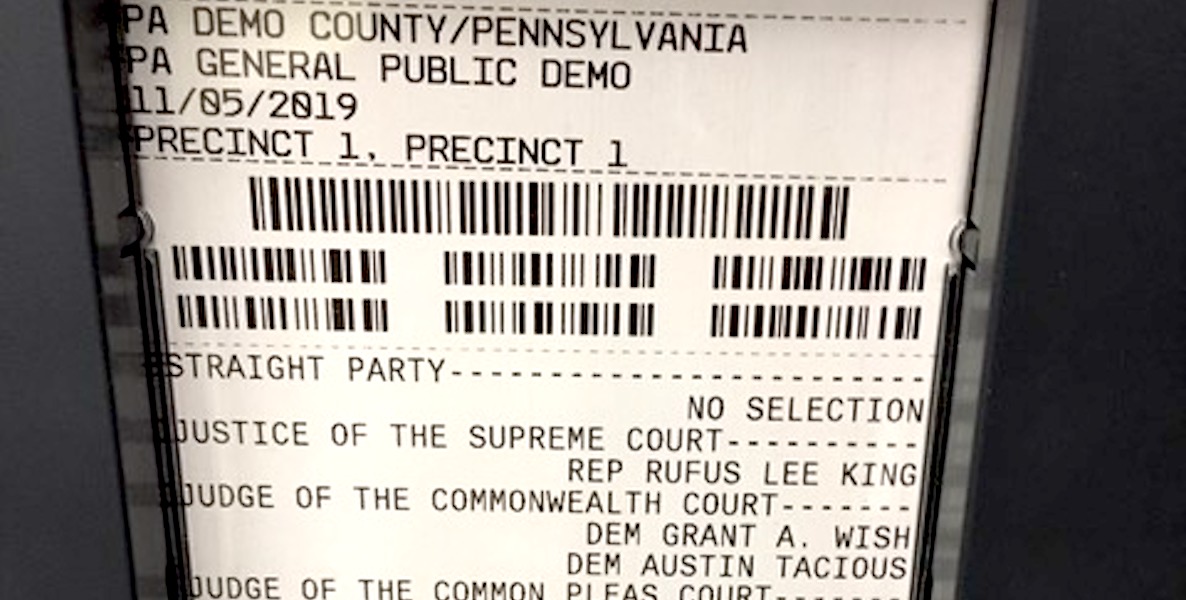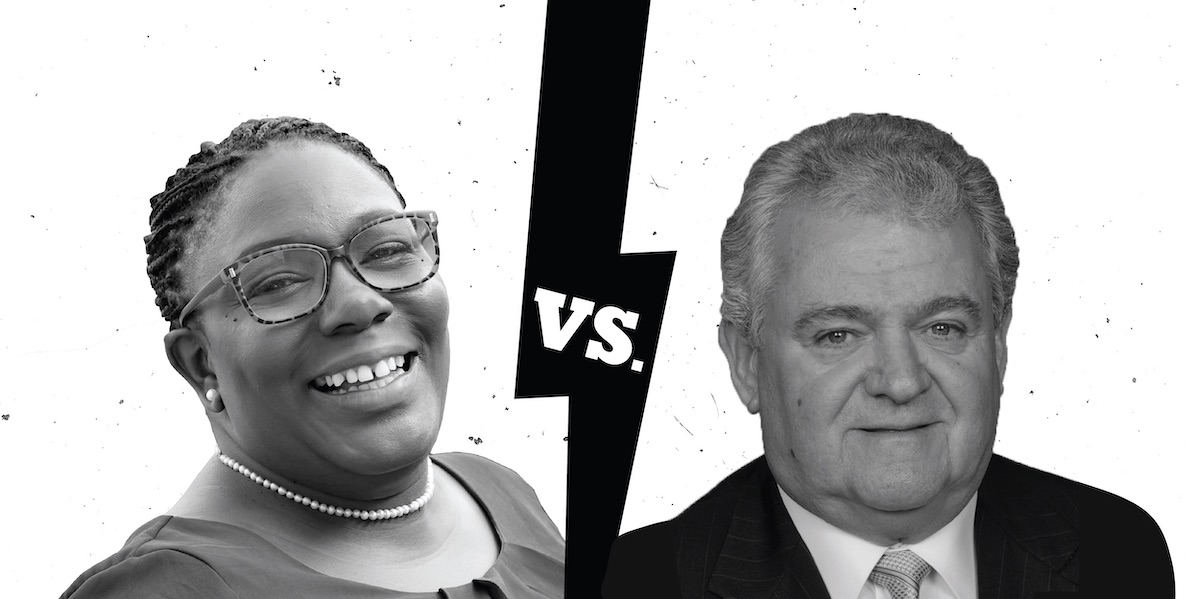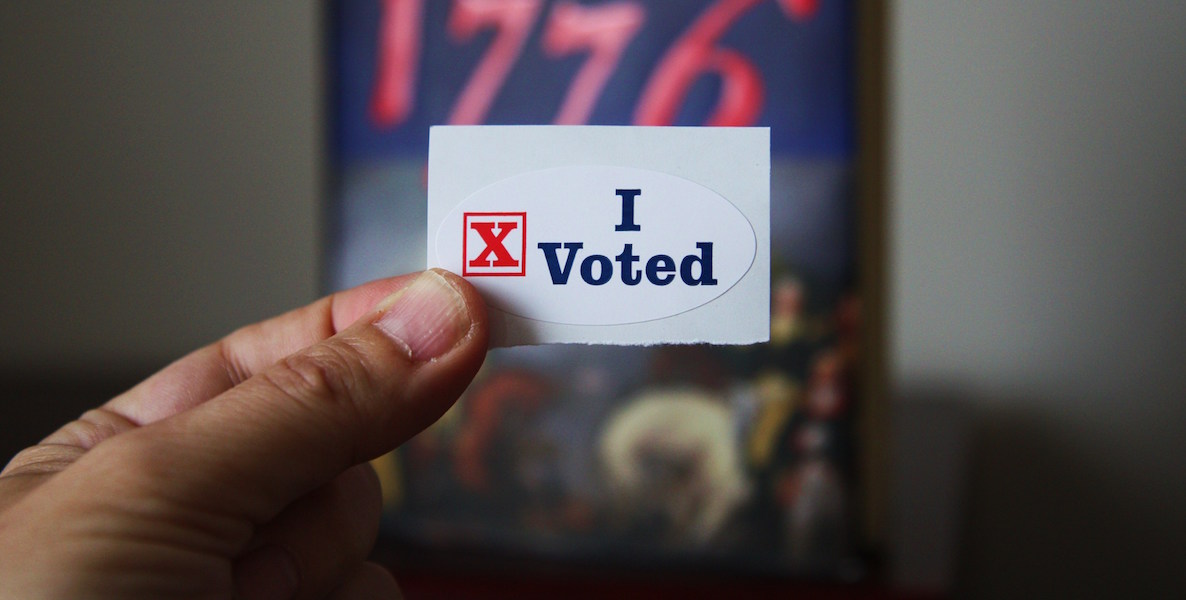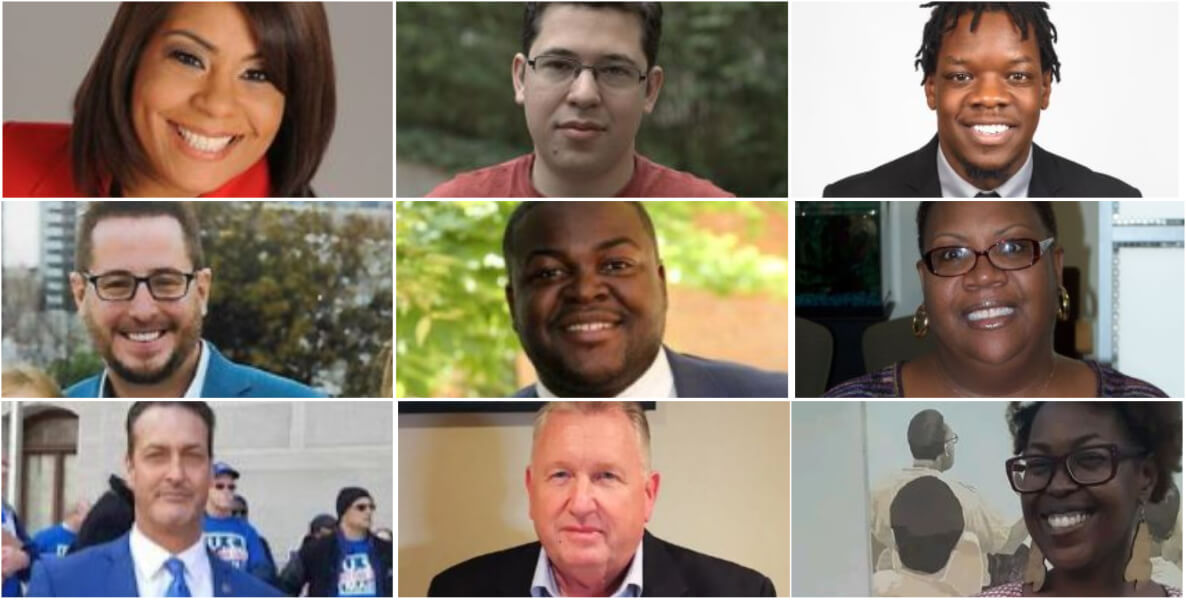After a couple of hours in the courtyard of Half Time Good Times, her neighborhood watering hole in North Philly, Councilwoman Maria Quiñones-Sánchez is pulling on her fourth beer when a twenty-something dude in a hoodie walks by and does a double take.
“Councilwoman Maria!” he exclaims, his voice lilting in surprise, as though he’s just seen a celebrity. “I voted for you!”
And then he is upon her, high-fiving, and the soon-to-be 51-year-old Quiñones-Sánchez is out of her seat, giving him her full attention. “That means I work for you, right?” she says, smiling. “You’re my boss.”
![]() And that kid, whose facial countenance hid behind a protective scowl just moments before? He beams. And then his Councilwoman talks to him not only like he matters, but like he is in the know. That shooting the other day, from around the way? You know what that was about? Weed, she says to him, as he nods his head solemnly. It’s at once a motherly warning to him—she’s in her village, and she’s raising—and an object lesson for me. “That’s what makes some of this legalization and decriminalization stuff complicated,” she says once her constituent has moved on.
And that kid, whose facial countenance hid behind a protective scowl just moments before? He beams. And then his Councilwoman talks to him not only like he matters, but like he is in the know. That shooting the other day, from around the way? You know what that was about? Weed, she says to him, as he nods his head solemnly. It’s at once a motherly warning to him—she’s in her village, and she’s raising—and an object lesson for me. “That’s what makes some of this legalization and decriminalization stuff complicated,” she says once her constituent has moved on.
In a fleeting interaction, Quiñones-Sánchez has modeled why I’ve come here. In recent weeks, fed up with the sunken state of our local political discourse, I’ve been searching for an elected official who practices what the late Mario Cuomo used to call “pragmatic progressivism.” The idea that governing is about getting beyond ideological sloganeering, snide finger-pointing, and political cynicism and, instead, doing the hard work of delivering for those who have hired you in the voting booth. Sometimes, that means working alongside people with whom you disagree, just as sometimes it means going to war with factions in your own tribe.
No one, it has dawned on me lately, has been more of a pragmatic progressive since her election to Council in 2007 than Quiñones-Sánchez, and she’s done it in a particularly badass way, by leaning in to hard calls, by flying in the face of orthodoxy when need be, (see: tax, soda), and by time and again standing up to, and staring down, the entrenched political machine. When she is reelected to a fourth term next Tuesday (let the whisperings of a 2023 mayoral bid begin), it will be a testament to the notion that going along to get along doesn’t have to be Philadelphia’s playbook for electoral success.
“If you listen to the narrative about me, they’re like, ‘She doesn’t get along with people,’” Quiñones-Sánchez says now; in her still-outsider parlance, “they” are the consortium of self-interested politicos who oppose her in her 7th Councilmanic district and the Democratic party stalwarts who benefit from the status quo she seeks to upend. “That’s their way of saying I don’t just go along and I’m not willing to go to jail for them, right?”
It is true that things have only gotten worse for those in Maria Quiñones-Sánchez’s district in the post-Great Recession years, but one shudders to think where the residents of neighborhoods like Feltonville, Frankford, Juniata Park and Quiñones-Sánchez’s native Hunting Park would be without her fighting for them.
In a city that often either wears down, chews up, or co-opts its would-be change agents, Quiñones-Sánchez has modeled staying power. The first Latina ever elected to Council and the first Puerto Rican/Latino to win a District seat, she and her team talk about it as an ongoing mission: The need to continually disrupt, to fight the power, to bring the outside in. She hasn’t just defied the City Committee machine, with its 3,000 foot soldiers; she’s run slates of candidates herself, and proudly wears the scars of such heresy.
The battle cry among her and her staff is Beyond The Press Conference. Unlike so many others on our public stage, who crib the talking points of everyone from Bill de Blasio to AOC to Bernie, Quiñones-Sánchez doesn’t even employ a director of communications. She’s an unabashed progressive, but not driven by ideology.
“Let’s define your terms,” she cautions, when I give voice to my “pragmatic progressive” postulate. “I believe I’m guided by progressive principles. But I’m pragmatic from the standpoint that, if I want to get something done, I don’t have to be right. I have a young Generation Z guy who is in this resistance movement, and I tell him I can sit in Council and be right all day and get nothing done. I can give really good speeches and hold really nice press conferences and not change the quality of life of the people I represent. That’s not why I went to Council. The people I represent don’t have that luxury.”
Make no mistake: Quinones-Sanchez is a progressive focused on equity and ![]() justice, as evidenced by the passage yesterday of her domestic workers bill of rights. But rather than toe some safe party line, Quiñones-Sánchez has carved out a niche as a legislator who embraces nuance, who will challenge those wearing her team’s colors, and who will fight for what she believes in. She represents a district with the highest poverty in the city—a daunting 41.6 percent rate over the last five years—and she hits all the right progressive notes when it comes to expanding safety net programming. But the pragmatist in her doesn’t stop there.
justice, as evidenced by the passage yesterday of her domestic workers bill of rights. But rather than toe some safe party line, Quiñones-Sánchez has carved out a niche as a legislator who embraces nuance, who will challenge those wearing her team’s colors, and who will fight for what she believes in. She represents a district with the highest poverty in the city—a daunting 41.6 percent rate over the last five years—and she hits all the right progressive notes when it comes to expanding safety net programming. But the pragmatist in her doesn’t stop there.
“From my conversations with her, she’s really concerned with growing the number of small businesses in her district,” says Center City District CEO and President Paul Levy, arguably our foremost evangelist for economic growth, as the CCD’s latest (sobering) report attests. “Maria understands that you can’t solve poverty just through social service spending. I don’t always agree with her on tax policy, but she’s very aware of the need to grow family sustaining jobs by removing the tax barriers to growth. I really admire that about her.”
Quiñones-Sánchez says her constituents like her “feistiness” but I’d proffer that what they really like is her authenticity. We know plenty of pols who talk about being fighters. In a finger-to-the-wind town, Quiñones-Sánchez leads with her chin. “Councilman [Curtis]Jones always says to me, ‘I know you can beat up the person in the schoolyard, but why you gotta make them cry, too?’” she says, laughing.
There’s a school of thought that, in politics, you win by keeping your head down and not making waves. More than anyone on our public stage, Quiñones-Sánchez has embraced wave-making, but of a distinct, iconoclastic kind. Whether it’s calling on her indicted colleague Bobby Henon to resign—the only Councilmember to do so; authoring legislation that created the Land Bank; partnering in her first term with then-Councilman Bill Green on a doomed tax reform plan; or helping to advance a tax credit for local B Corps, Quiñones-Sánchez has shown a willingness to do what legislators ought to do: Wade into policy and take strong positions that can alienate parts of the electorate.
In politics, defying your base on a matter of principle is actually a hallmark of character, a type of courageous act. (By that measure, the current occupant of 1600 Pennsylvania Avenue is a little scaredy-cat.) For Quiñones-Sánchez, such acts appear to fall under the heading of Just Another Day In City Hall. Let’s run through just a couple of such issues that she has taken on with particularly pugilistic gusto:
The soda tax comes immediately to mind. What liberal isn’t for raising taxes to cover universal Pre-K, after all? Maria, that’s who, framing a cutting limousine liberal argument as her rationale. “If it’s a beverage tax, let’s make it a beverage tax so the $7 latte is also taxed,” she says. “But when you say to poor people the only way we can save you is by taxing you and then I’m going to drink my $7 latte and not pay a tax on that, well, that’s just your privilege talking. That is unacceptable.”
Besides, she’s quick to point out, we don’t even have universal kindergarten. “So we have thousands of kids who are in our pre-K program who don’t even have access to kindergarten,” she says. “Does that seem like smart policymaking to you?”
Quiñones-Sánchez is a fighter, but she’s not a hater. Whether she’s taking on the Chamber of Commerce types on disinvestment in her community—“if banks are going to do what they always do, we’ll always have a lack of capital for entrepreneurship”—or longtime allies when it comes to locating a safe injection site in her district, she doesn’t question motives or resort to name-calling. She practices the antiquated political notion of persuasion.
“If you listen to the narrative about me, they’re like, ‘She doesn’t get along with people,’” Quiñones-Sánchez says. “That’s their way of saying I don’t just go along and I’m not willing to go to jail for them, right?”
“I tell the safe injection site people that tell me I’m wrong and I have blood on my hands, like, I was doing harm prevention before it was a term,” she says. “Prevention Point was operating out of a mobile unit and now they have a full-fledged clinic. I did that. I was the person going to residents saying, ‘We need to do this.’ So please don’t do that to me. Coming at me is not going to get you anywhere. I have a lot of respect for [Safehouse VP] Rhonda [Goldfein] and [Prevention Point Executive Director] Jose [Benitez], but people still don’t have access to treatment, we have legacy providers that are horrible, we don’t even have a report card for our providers, and you’re telling me that saving 75 lives a year at a safe injection site is the panacea?”
Instead, Quiñones-Sánchez maintains, we need to think more holistically if we’re going to solve big problems like the opioid epidemic. “We need a comprehensive plan,” she says. “You know how I know that? Personal experience. I say to [Health Commissioner Thomas] Farley all the time, ‘how many funerals have you gone to?’ I’ve lost cousins, family members, friends. I had a family member in jail ten years, came out last Thursday and died of an overdose on Saturday. My father was a functioning alcoholic, so I know what we’re up against. We’re not approaching this in a way that reflects the reality of functioning folks on a life journey. We’ve got to get in touch with people’s families and ask, ‘What will it take to take your loved one back?’ Because no one recovers without love. But we have no reunification plan, and no leadership. At least when Rendell did needle exchange, he led it, he owned it, he funded it. This mayor’s notion that the liability is yours and not ours? That’s not leadership.”
Ah, yes, this mayor. Don’t get her started. “For a person who wanted to be mayor so badly, it is sad to watch him not enjoy it,” she says. “Councilman Kenney was a good ally, who understood that District Council people were in the weeds and coming up with ideas that were good for the whole city. Can I get Councilman Kenney back? I miss that guy.”
![]() It’s widely suspected that Quiñones-Sánchez harbors mayoral ambitions herself; she regularly seeks the counsel of all of our former mayors. “I was speaking to Nutter the other day and I said, ‘I never thought I was going to miss you this much,’” she says, laughing. “And he said, ‘You would tell me that directly.’ But, seriously, I would rather have the mess I knew than the mess I was going to get. What I’ve learned from the ex-mayors, and from learning all I can about the budget as head of the appropriations committee, is that there’s really maybe $300 million in the budget that a mayor can use to implement his priorities. Well, Kenney kept most of the pet projects he inherited and that’s why we’ve got this 25 percent increase in spending—he’s had to bring more money in because he didn’t make the hard budgeting decisions.”
It’s widely suspected that Quiñones-Sánchez harbors mayoral ambitions herself; she regularly seeks the counsel of all of our former mayors. “I was speaking to Nutter the other day and I said, ‘I never thought I was going to miss you this much,’” she says, laughing. “And he said, ‘You would tell me that directly.’ But, seriously, I would rather have the mess I knew than the mess I was going to get. What I’ve learned from the ex-mayors, and from learning all I can about the budget as head of the appropriations committee, is that there’s really maybe $300 million in the budget that a mayor can use to implement his priorities. Well, Kenney kept most of the pet projects he inherited and that’s why we’ve got this 25 percent increase in spending—he’s had to bring more money in because he didn’t make the hard budgeting decisions.”
If she is, in fact, looking at 2023, Quiñones-Sánchez will have a story to tell, a story about persistence and resilience, a story about the immigrant experience in Philadelphia. She came here from Puerto Rico in the late ’60s, with her two older brothers and her mom, who she calls her hero, a factory worker who raised her 18 brothers and sisters. In elementary school, a boy beat Maria up on the playground. When her brother instructed her to revisit the scene of the beatdown and exact retribution upon that same nemesis the next day, she didn’t know that he’d already paid a visit to her tormentor and had fixed the rematch in her favor. To this day, she doesn’t back down from bullies. Talk about symmetry: Here she is, representing a district with the worst poverty in the most impoverished city in America. Could there be a group of pushed-around citizens more in need of a metaphorical big brother?
It is true that things have only gotten worse for those in Maria Quiñones-Sánchez’s district in the post-Great Recession years, but one shudders to think where the residents of neighborhoods like Feltonville, Frankford, Juniata Park and Quiñones-Sánchez’s native Hunting Park would be without her fighting for them. She’s infamous among her staff for wading into policy papers in the wee hours and for her 3 am emails, but one has to wonder if what keeps her up at night the most is the challenge of preserving a city’s most precious resource: Hope. As we’re leaving the bar—the last remaining establishment owned by a Puerto Rican in the Norris Square neighborhood, she’s quick to point out—I ask if she ever gets overwhelmed. The problems are so intractable. The challenges so immense. The roadblocks so imposing.
She stops, and smiles. By now, no doubt, this is a well-worn exercise, managing the gulf between ambition and possibility. She thinks back to her time as a student at Lincoln University. “I took a sociology class in college, and the professor made us reframe everything we said so there’s no deficit, no negative, no can’t. It was the hardest semester, but it stayed with me.”
That, it turns out, may have been just what the seventh councilmanic district needed: Someone fighting for it, someone practicing the idiosyncratic art of reframing. As we part, Quiñones-Sánchez is talking about the special committee on poverty she’s co-chairing with Allan Domb.
“I told Council President Clarke I’d only do it if we were going to do something,” Maria Quiñones-Sánchez says. And then, before turning around to make the two-block walk home: “There’s so much we can do.”

Prefer the audio version of this story? Listen to this article in CitizenCast below:










